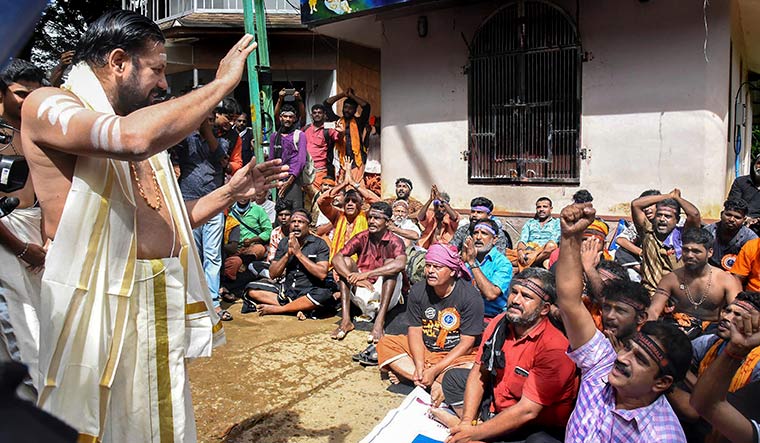Historians have been taken aback by the Thazhamon family's claim that they were given 'tantra' rights in Sabarimala some 100 years before the birth of Jesus Christ. The family made the claim two days after the Travancore Devaswom Board served a show-cause notice on Sabarimala tantri Kandararu Rajeevaru for shutting down the temple for a purification ritual after two women entered the sanctum sanctorum of the shrine on January 2.
Historian M.G. Sashibhooshan was tolerant, though he sounded amused about the tantri family's claims. “It could be a belief that the family holds near,” he said. “Fact is, the first wave of Brahmin migration happened in the 1st or 2nd century AD. They came from Tulu Nadu to north Kerala, and records say they were encouraged to make the shift by the great Kadamba king Mayura Sharman who himself was a Brahmin,” Sashibhooshan said.
It was during the second wave of migration, during the 5th and 6th century AD, that the two renowned Brahmin families—Tharanelloor and Thazhamon—crossed over to Kerala.
Even conservative historians are wary of the claims of the Sabarimala tantri family. M.P. Appu, author on temple beliefs and the chairman of Kshethra Ekopana Samithi, said it could not be exactly said that the Thazhamon family had reached Kerala in 100 BC.
Nonetheless, there is what Sashibhooshan calls a “sacred legend” about the journey of the two Brahmin families. “They had to cross the Cauvery river to reach Kerala. Lord Parashurama asked both of them to walk over the water. The Tharanelloor Brahmin blindly trusted the sage and walked over the water, just the way Jesus had, but the Thazhamon representative, as if he did not have full faith in Parashurama, first checked the depth of the river,” Sashibhooshan said. But even this legend is traced to the 5th or 6th century AD.
Historians say that the Thazhamon family wants to advance the date by a few centuries and then pass off this “sacred legend” of Sabarimala as the sacred truth. The family has said that it was none other than Parashurama who had handed over the tantra rights of Sabarimala to them.
“How can they say this when no historian has ever properly documented the life of Parashurama, or has even approximated the era in which the sage must have existed,” said historian Lakshmi Rajeev. Appu gave the Parashurama connection a new spin to free the entity from myth. “This Parashurama the Thazhamon family is speaking about is not the fifth avatar of Vishnu as many have mistaken. This is another person with the name of Parashurama,” he said.
However, a senior Thazhamon family member, who wished to remain anonymous, told Onmanorama that it was the “original” Parashurama himself who had bestowed on them the 'tantra' rights.
The family's claim to divine rights over Sabarimala has been contested on historical grounds, too. “There are documents to show that Sabarimala tantra was once the right of Kuzhikattu illam. Before that, the temple was administered by the Mala Araya tribe,” Lakshmi Rajeev said.
T.S. Syamkumar, historian and an authority on Sanskrit writings, said the Thazhamon family's version flies against recorded facts. “The Brahmanical influence in temples became strong only during the 8th and 9th centuries. An inscription dated to 855 AD excavated from Irinjalakkuda testifies to this," he said. Further, Syamkumar said books related to tantric religious practices were written only after 10th century AD. Even the Tantrasamuchayam, which the tantris consider the most authoritative text, was written in 15 AD.
He also said manuscripts collected from Cheerappanchira and Chembazhannoor revealed that in the early days, Sabarimala followed non-Brahmanical rituals. "In fact, the epics are silent about the legend of Ayyappa. There is mention of Vishnu's Mohini avatar and how Shiva is seduced. Nothing more," Syamkumar said, hinting that Ayyappa could be a tribal construct.
Mala Araya tribe leader and historian P.K. Sajeev is the most scathing on the claims of the Sabarimala tantri family. “By their claim, the Thazhamon family has effectively pushed the Pandalam royal family, and even Lord Ayyappa, out of Sabarimala's history,” Sajeev said.
“The family said they started work in Sabarimala in 100 BC. But history tells us that the Pandalam dynasty was established only in 1100 AD. And wasn't Ayyappa born after the Pandalam dynasty was established?” he asked.
-Via onmanorama



